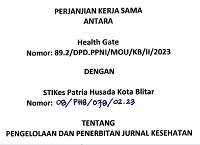Community Stigma Against Puskesmas Services During the Covid-19 Pandemic
Abstract
During the COVID-19 outbreak, there is one social phenomenon that has the potential to aggravate the situation, namely social stigma or negative associations towards a person or group of people who experience symptoms or have certain diseases. They are labeled, stereotyped, discriminated against, treated differently, and or subjected to status abuse because they are associated with a disease. Stigma will cause the spread of disease in the community to get out of control, this study aims to identify community stigma towards Puskesmas services during the COVID-19 pandemic in the Sananwetan Puskesmas area. This study included descriptive qualitative research exploring the population of this study totaling 4,658 people, then a research sample of 102 respondents was selected, sampling techniques in this study used Non-Probability Sampling with the Convenience Sampling / Accidental Sampling method, samples who were willing to become respondents were then given a stigma questionnaire against puskesmas services during the Covid-19 pandemic. Based on the results of the research conducted, it can be concluded that the results of univariate data analysis to determine whether there is a stigma of the community towards puskesmas services during the Covid-19 pandemic showed that 69 (67.7%) respondents had a negative stigma towards puskesmas services during the Covid-19 pandemic. The public is required to be more active in seeking information related to the COVID-19 virus through puskesmas health promotion in the form of leaflets, counseling on the radio, puskesmas cadres, so that it is not easy to be exposed to negative issues circulating in the community about covid-19.
Full Text:
PDFReferences
Cui J, Li F, Shi Z-L. Origin and evolution of pathogenic coronaviruses. Nat Rev Microbiol. 2019;17(3):181–92.
Corman VM, Landt O, Kaiser M, Molenkamp R, Meijer A, Chu DKW, et al. Detection of 2019 novel coronavirus (2019-nCoV) by real-time RT-PCR. Eurosurveillance. 2020;25(3):2000045.
Sasongko YPD. Mitigasi Coronaphobia di Tengah Pandemi COVID-19 dalam Komunikasi Interpersonal Herbert Blumer. In: Seminar Nasional Psikologi UM. 2021. p. 350–7.
World Health Organization. Stigma Sosial Terkait Dengan COVID-19. Unicef. 2020;1–
Arboleda-Florez J. What causes stigma? World Psychiatry. 2002;1(1):25.
Dai NF. Stigma masyarakat terhadap pandemi covid-19. Pros Nas Covid-19. 2020;66–73.
Abudi R, Mokodompis Y, Magulili AN. Stigma Terhadap Orang Positif Covid-19. Jambura Journal of Health Sciences and Research, 2 (2), 77–84. 2020.
Depkes RI. Kategori umur Menurut depkes RI. 2009.
Ashari RG. Memahami hambatan dan cara lansia mempelajari media sosial. 2018;
Apjii A. Penetrasi dan perilaku pengguna internet indonesia. Infografis Has Surv. 2016;2016:1–35.
Delello JA, McWhoRteR RR, Camp KM. Integrating augmented reality in higher education: A multidisciplinary study of student perceptions. J Educ Multimed Hypermedia. 2015;24(3):209–33.
Ciboh R. An exploratory study of older adultsʼ social media use and social capital in Nigeria. Athens J Mass Media Commun. 2017;3(2):149–65.
Budiman RA. Kapita selekta kuesioner: pengetahuan dan sikap dalam penelitian kesehatan. Jakarta Salemba Med. 2013;2013:P4-8.
Abdillah L. Stigma Terhadap Orang Positif COVID-19 (Stigma on Positive People COVID-19). Pandemik COVID-19 Antara Persoalan Dan Refleks Di Indones Forthcom. 2020;
DOI: https://doi.org/10.70111/hg1303
Refbacks
- There are currently no refbacks.
"Health Gate"
ISSN 2986-1098
Indexing:
Published by The Regional Leadership Council of the Indonesian National Nurses Association, Blitar City
Kalimantan Street, Kel.Karangtengah, Kec. Sananwetan, Blitar City, East Java, Indonesia


.png)








